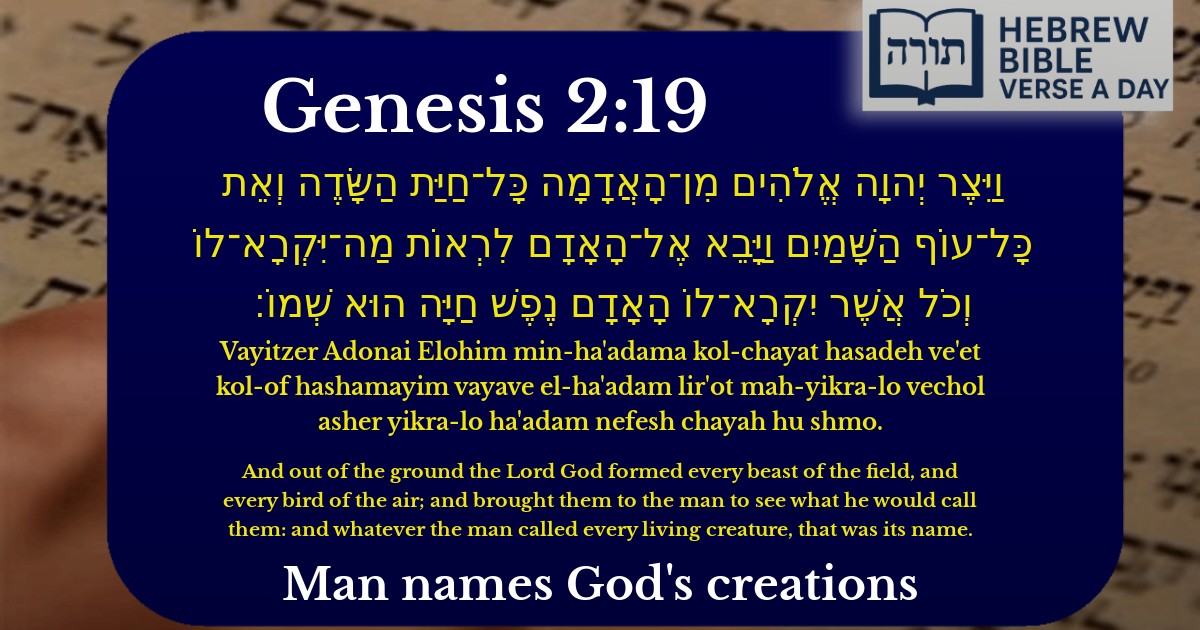Join Our Newsletter To Be Informed When New Videos Are Posted
Join the thousands of fellow Studends who rely on our videos to learn how to read the bible in Hebrew for free!
Hebrew Text
וַיִּצֶר יְהוָה אֱלֹהִים מִן־הָאֲדָמָה כָּל־חַיַּת הַשָּׂדֶה וְאֵת כָּל־עוֹף הַשָּׁמַיִם וַיָּבֵא אֶל־הָאָדָם לִרְאוֹת מַה־יִּקְרָא־לוֹ וְכֹל אֲשֶׁר יִקְרָא־לוֹ הָאָדָם נֶפֶשׁ חַיָּה הוּא שְׁמוֹ׃
English Translation
And out of the ground the Lord God formed every beast of the field, and every bird of the air; and brought them to the man to see what he would call them: and whatever the man called every living creature, that was its name.
Transliteration
Vayitzer Adonai Elohim min-ha'adama kol-chayat hasadeh ve'et kol-of hashamayim vayave el-ha'adam lir'ot mah-yikra-lo vechol asher yikra-lo ha'adam nefesh chayah hu shmo.
Hebrew Leining Text
וַיִּ֩צֶר֩ יְהֹוָ֨ה אֱלֹהִ֜ים מִן־הָֽאֲדָמָ֗ה כׇּל־חַיַּ֤ת הַשָּׂדֶה֙ וְאֵת֙ כׇּל־ע֣וֹף הַשָּׁמַ֔יִם וַיָּבֵא֙ אֶל־הָ֣אָדָ֔ם לִרְא֖וֹת מַה־יִּקְרָא־ל֑וֹ וְכֹל֩ אֲשֶׁ֨ר יִקְרָא־ל֧וֹ הָֽאָדָ֛ם נֶ֥פֶשׁ חַיָּ֖ה ה֥וּא שְׁמֽוֹ׃
וַיִּ֩צֶר֩ יְהֹוָ֨ה אֱלֹהִ֜ים מִן־הָֽאֲדָמָ֗ה כׇּל־חַיַּ֤ת הַשָּׂדֶה֙ וְאֵת֙ כׇּל־ע֣וֹף הַשָּׁמַ֔יִם וַיָּבֵא֙ אֶל־הָ֣אָדָ֔ם לִרְא֖וֹת מַה־יִּקְרָא־ל֑וֹ וְכֹל֩ אֲשֶׁ֨ר יִקְרָא־ל֧וֹ הָֽאָדָ֛ם נֶ֥פֶשׁ חַיָּ֖ה ה֥וּא שְׁמֽוֹ׃
🎵 Listen to leining
Parasha Commentary
📚 Talmud Citations
This verse is quoted in the Talmud.
📖 Chullin 60b
The verse is referenced in a discussion about the naming of animals by Adam and the nature of their creation.
📖 Sanhedrin 38b
The verse is cited in a discussion about the creation of Adam and his role in naming the animals, highlighting his wisdom and uniqueness.


The Divine Formation of Animals
The verse states, "And out of the ground the Lord God formed every beast of the field, and every bird of the air" (Genesis 2:19). Rashi explains that this formation occurred on the sixth day of Creation, alongside the creation of Adam. However, the Torah elaborates here to clarify that Hashem brought the animals before Adam for naming. Ramban adds that this demonstrates Hashem's kindness in providing Adam with a companion, as the naming process would help him recognize that none were suitable for him, leading to the creation of Chava (Eve).
The Purpose of Naming
The verse continues, "and brought them to the man to see what he would call them." The Midrash (Bereshit Rabbah 17:4) teaches that Adam's wisdom was evident in his ability to assign names that reflected the essence of each creature. The Sforno emphasizes that this task showcased Adam's intellectual superiority, as he could discern the unique characteristics of each animal and assign fitting names. The Talmud (Chullin 59b) further elaborates that Adam’s naming was precise—for example, he called the cow "shor" because it resembles a "shurar" (a ditch) in its plowing.
The Significance of Names in Jewish Thought
The verse concludes, "and whatever the man called every living creature, that was its name." The Rambam (Moreh Nevuchim 1:2) explains that names in Hebrew are not arbitrary but reflect the intrinsic nature of the named. This concept is foundational in Kabbalah, where names hold spiritual power. The Zohar (Bereshit 1:20a) teaches that Adam’s naming was an act of prophecy, as he perceived the divine energy within each creature. This aligns with the principle that Hebrew is the lashon hakodesh (holy language), where words and names embody deeper truths.
Key Lessons from the Verse